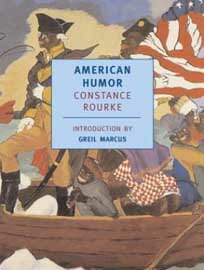
In American Humor, Constance Rourke incisively traces the sudden appearance and subsequent development of uniquely American styles of humor, and their impact on American literature. Greil Marcus introduces this recent reissue (originally published in 1931), explaining that in the absence of today’s American Studies departments and folk-music box sets, Rourke had to use what she could find: “old almanacs, newspaper files, forgotten biographies, songbooks, joke manuals, penny dreadfuls, the unreliable leavings of nineteenth-century American culture.”
Rourke knits this crazy quilt of material into lucid and sustained analysis, opening with a discussion of three American archetypes that flourished in pre-Civil War humor and folktale: the sharp, taciturn Yankee; the backwoodsman (think Davy Crockett); and the minstrel (blackface singing, it turns out, arose almost simultaneously with serious abolitionism). “Each had been a wanderer over the land,” Rourke writes. “Comic triumph appeared in them all. … Laughter created ease and even more, a sense of unity, among a people who were not yet a nation and who were seldom joined in stable communities.” Similarly, she argues, did the strolling actors of the pre-Civil War period give expression to the strangeness of the American setting: “The new country made a strangely painted backdrop before which the American seemed constrained to perform,” she writes. The book traces the further permutations of this now broadly established tradition of American humor in such great American writers as Whitman, Poe, Dickinson, Twain, Lardner and—a reference that would’ve made Rourke too cool for school in 1931—T.S. Eliot.
How does Rourke read today? Her constant reference to such unitary abstractions as “American humor” will raise our heterogeneous hackles; when she writes of “the American character,” many readers will want to add an s. And we have our reasons. But the reissue of her book—beloved in its time by such giants as Louis Mumford and later by Pauline Kael and Lester Bangs—also reminds us that those wide generalizations, which seem quaint today, once allowed scholars to write books with the sweeping range and explanatory power of, well, American Humor itself.